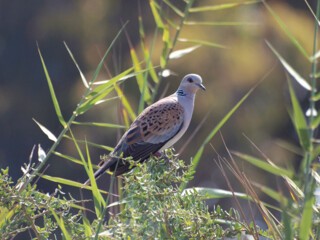No Turtle Doves
Chris Larkin
The Christmas season technically begins on Christmas Day, not, as it may often seem, in mid-October. Christmastide – as the period is called in liturgical circles – lasts for twelve days, until 5 January, the night before the feast of Epiphany.
The origins of the Christmas carol ‘The Twelve Days of Christmas’ are not entirely clear, though it is commonly thought that it originated (probably in France) as a memory song, sung in a round until someone made a mistake (and paid a forfeit). The most well-known English version of the lyrics was published in 1780, in a children’s book called Mirth without Mischief; the composer Frederic Austin put the words to a traditional melody in 1909 to give us the song we now know.
Austin’s setting gives us the characteristic two-bar ‘Five gold rings’, as well as some of the ordering of the verses and a change from ‘colly birds’ to ‘calling birds’ on day four; colly being an Old English term for coal, the birds in question were probably blackbirds.
Blackbirds are among Britain’s commonest birds, with more than five million breeding pairs. French hens aren’t at risk either. But turtle dove numbers in the UK have dropped by over 90 per cent since 1994; across Europe, numbers are down by 78 per cent. They are smaller, darker and ‘daintier’ than a collared dove, with a mottled chestnut – ‘turtle’ – colour to their upper-parts. They winter in West Africa but fly to Europe in the summer to breed. Their severe decline is thought to be caused by a lack of loose seed and grain to feed on when they get here – probably a result of changes in farming practices. Turtle doves’ soft cooing used to be a familiar accompaniment to summer days, but no longer; they are now on the Red List of species with the highest conservation priority.
The numbers of grey partridge have also fallen drastically over the past few decades (nothing to do with a loss of pear orchards; in reality the birds are ground-based). The British Trust for Ornithology recorded a 91 per cent decline between 1967 and 2010. They were helped by the UK Biodiversity Action Plan, which ran between 1992 and 2012. Even so, there are only around 43,000 breeding pairs left in the UK. Like the turtle dove, this once very common, widespread bird is now on the Red List. With agricultural and conservation policies – like so much else – currently in limbo, it’s hard to see the future for either of these birds getting brighter any time soon.
Since 1984, the financial services company PNC has maintained a price index which monitors the cost of buying all the gifts mentioned in ‘The Twelve Days of Christmas’. The total, now hovering around $39,000, has almost doubled over 35 years. The cost of the partridge (plus tree) is about $200; the turtle doves come in at around $375. If current trends continue, the prices of both look set to keep on going up. But not for ever. A point may come when no amount of money will be able to buy either.

Comments
The birds are not just there for us to eat, but to help us believe in something beyond reality, which I'm beginning to think is not just necessary but essential, as we say in the world of transcendence, against the draining effect of democratic mediocrity and its dirty residue of "clarity".
But back in town, I will consider the possibility of shooting down the ring-necked parakeets like drones and getting them baked in pies by local artisans. Global warming, eat your heart out.